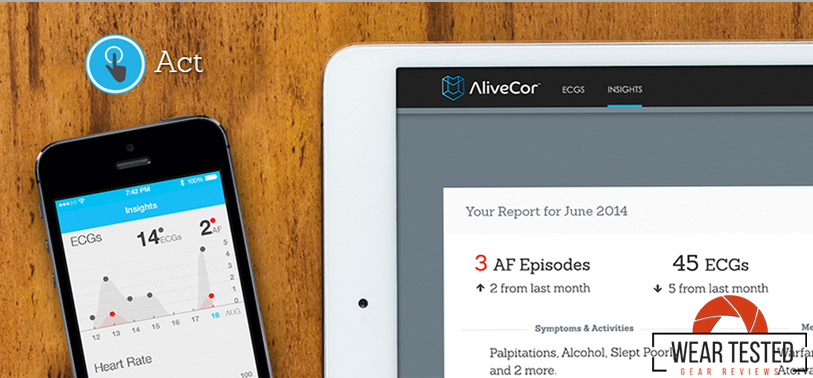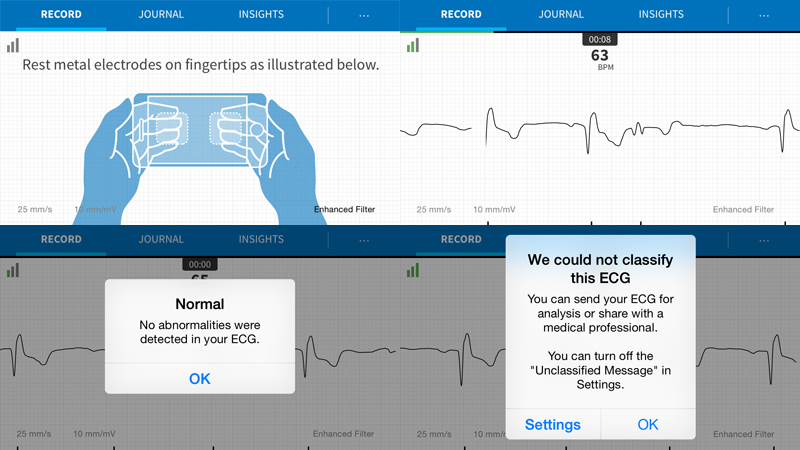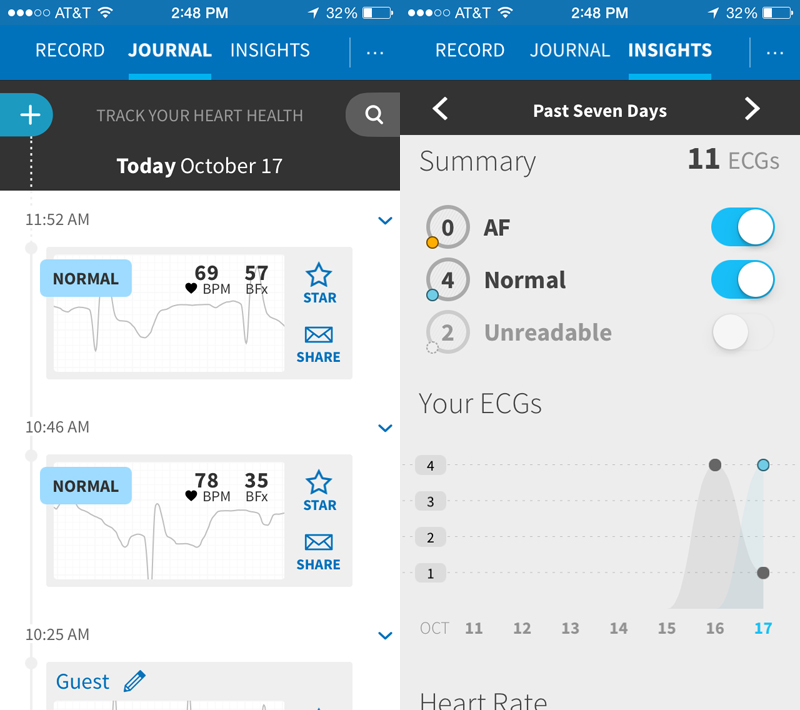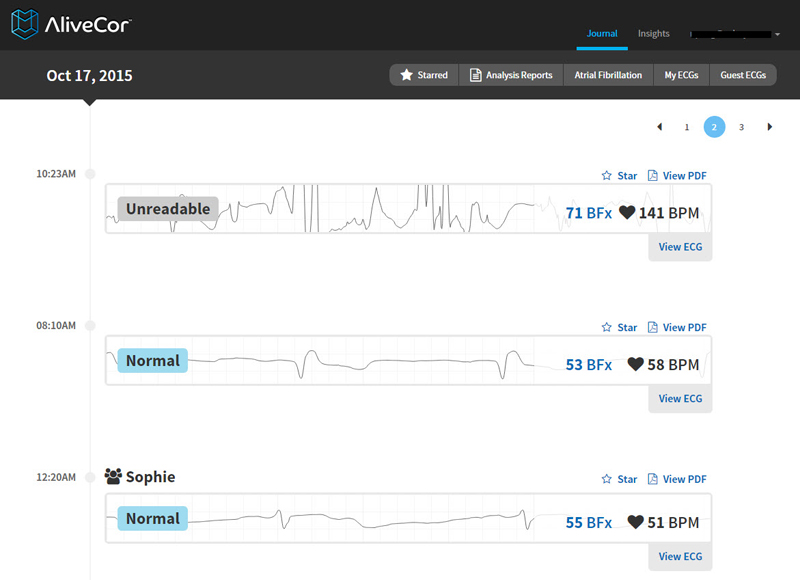[cmsms_row data_padding_bottom=”10″ data_padding_top=”10″ data_color=”default” data_width=”boxed”][cmsms_column data_width=”1/1″][cmsms_divider width=”long” height=”2″ style=”dashed” position=”center” margin_top=”5″ margin_bottom=”5″ animation_delay=”0″][cmsms_text animation_delay=”0″]
Active and health conscious individuals like runners and cyclists need to get to the core of their heart health. AliveCor Mobile ECG from Omron Healthcare allows you to precisely do that. Instantly know if atrial fibrillation, the most common heart rhythm disturbance and a leading cause of stroke, is detected in your ECG. Feel the peace of mind of knowing when your ECG is normal.
Collect. Learn. Act.
The AliveCor Mobile ECG, when used with the free AliveECG app, is a personalized, easy-to-use device that records accurate ECGs and heart rate anywhere, anytime at an affordable cost. Simply rest it on your fingers or chest to record an ECG in just 30 seconds. And know right away if atrial fibrillation is detected. Simple!
AliveCor’s FDA-cleared Atrial Fibrillation (AF) Detector immediately detects atrial fibrillation in an ECG. For the first time, you can have the peace of mind knowing if AF is detected or not.AF affects over 140 million people worldwide, but the good news is that 3 out of 4 strokes can be prevented if detected and treated.
For this test, we used the 3rd generation AliveCor Mobile ECG with a case for my iPhone 5s.
Rest the monitor on your fingers; your right hand should contact the electrode closest to the bottom of the mobile device, and your left hand should contact the electrode closest to the top of the mobile device. You will have to record your first ECG and have created an account on Alivecor before you can have future ECG readings recorded.
A few simple things to watch out for before you can get acceptable readings .I did both and got frustrated when my ECG cannot be classified…
- Audio and video products and similar equipment may cause interference.
- The mobile device power adapter may degrade signal detection. Do not use the monitor while charging the mobile device.
Once you get ECG readings recorded, you can track it on the Alivecor web site and in the mobile app. Friends and family can also use your unit as guests to get their AF readings.
Use with Care (medical disclaimer):
The AliveECG app includes the ability to request professional clinical interpretation and analysis of your ECG recordings. Due to telemedicine restrictions, your location may restrict your ability to use this service. AliveCor does not know your location; it is your responsibility to ensure this service is legal according to your local telemedicine laws. This service is not intended to replace medical advice, please seek professional medical assistance if you are suffering from any medical problem.
The AF Detector algorithm monitors for atrial fibrillation only. It will not detect other potentially life threatening arrhythmias, and it is possible that other cardiac arrhythmias may be present.
[/cmsms_text][cmsms_text animation_delay=”0″][/cmsms_text][cmsms_notice type=”cmsms_notice_error” icon=”cmsms-icon-info-circled” animation_delay=”0″]
What is Atrial Fibrillation?
The most common type of non-sinus tachyarrhythmia is atrial fibrillation. In this case, disorganized electrical impulses that originate in the atria and pulmonary veins initiate the electrical activity in the conduction system of the heart. This causes what are commonly termed as “irregularly irregular” heart beats.
When a heart is in atrial fibrillation, its two upper chambers, the right and left atria essentially quiver, instead of beating efficiently. This does not allow for complete emptying of the atria and thus, blood may become stagnant and create blood clots. This can lead to major problems, namely, strokes, transient ischemic attacks (TIAs), and pulmonary emboli (PEs); depending which chamber of the heart has the blood clot in it.
Approximately 15 percent of strokes occur in people with atrial fibrillation. As age increases in a population, so too does the incidence of atrial fibrillation, which peaks at about 3-5% in people over the age of 65.
The most common presenting symptoms of atrial fibrillation are palpitations, dizziness, fast pulse rate, irregularly irregular rhythm, an abnormal heart sound (S1), chest pain, chronic shortness of breath, abnormal jugular venous pressure, fatigue, and impaired exercise tolerance. Other symptoms related to TIAs and strokes may be the initial symptoms of atrial fibrillation.
Some of the most common causes of atrial fibrillation are long-standing hypertension, congestive heart disease, cardiac valvular lesions, myocardial infarctions, history of coronary artery bypass grafts, hyperthyroidism, alcohol abuse, smoking, diabetes mellitus, and electrolyte imbalances.
[/cmsms_notice][cmsms_text animation_delay=”0″]
I’ve only had an ECG taken by a cardiologist or by a medical technician for life insurance purposes. But the Alivecor Mobile ECG top it all – get your AF readings anytime, anywhere. And as frequently as you want. If something shows up, contact your physician. Don’t let AF affect your physical activities especially running and cycling, as it can be prevented. Your family will thank you for it. For less than $100, it is a no-brainer. Available for purchase online at Omron Healthcare.
[/cmsms_text][cmsms_divider width=”long” height=”2″ style=”dashed” position=”center” margin_top=”5″ margin_bottom=”5″ animation_delay=”0″][/cmsms_column][/cmsms_row]






